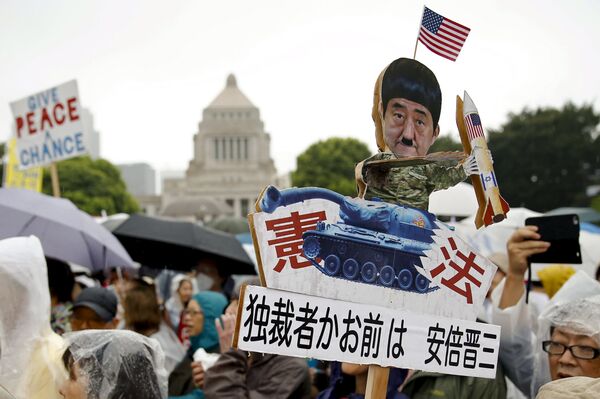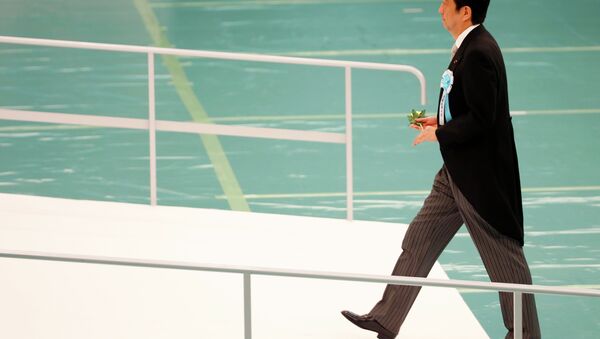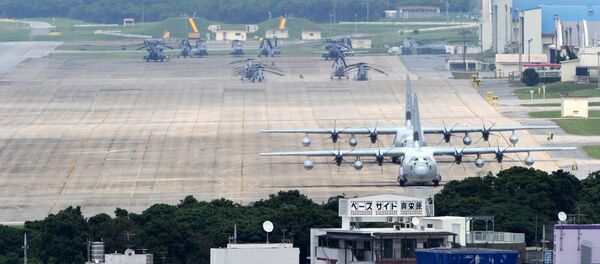The security bills were pushed through Japan's lower house of parliament by Abe's government in July, despite parliamentary walkouts from opposition parties and tens of thousands of people taking to the streets to protests against the reforms.

The proposals are now being discussed by Japan's upper house, with members expected to vote this week on whether to approve the unprecedented security measures.
Criticism: 'Abe Bringing Japan Back to the Wartime Period'
The prime minister has attracted widespread criticism over his pursuit and support of such military proposals, with critics accusing him of undermining Japan's pacifist constitution amid fears it could drag the country into a US-led regional conflict.

Among the most vocal critics were survivors of Japan's atom bomb attacks in Hiroshima and Nagasaki, who used this year's 70th anniversary of the tragedies to condemn the security bill proposals, which would allow for Japanese military forces to fight in overseas conflicts if an allied nation became involved in war.
86-year-old bombing survivor Sumiteru Taniguchi said:
"After the war, the Constitution was enacted in which Japan promised to the world that it would never wage war or take up weapons again. However, the government is about to bring Japan back to the wartime period."
Currently, legislation only allows Japan's defense forces to take up arms as an act of self-defense.
#Japan police block protesters from approaching Parliament. Sign reads: DOWN WITH ABE GOVERNMENT Photo: @makomelo pic.twitter.com/mZCVSoagLZ
— ソトン (@Thoton) September 14, 2015
This has led to criticism that Japan will merely become a tool for increased US presence in the region, given the tension between Washington and Beijing.
Support: 'Strong Arm Needed Amid Chinese Threat'
However, supporters of Abe have pointed to the country's economic recovery and political stability, along with the perceived threat of Chinese aggression in the region, as reasons to support the prime minister and his reforms in the matter of national interest.
About 500 pro-Abe supporters rally in favor of security bills Saturday. pic.twitter.com/GwHmkJOABw
— Dr. Nancy Snow (@drpersuasion) August 30, 2015
Japan has accused China of engaging in increasingly aggressive tactics in east Asia, particularly in regards to disputed islands and natural resources in the region.
Researchers have pointed out that a fear of China's intentions, plus an urge to build stronger relations with western allies such as the US and Australia have been longstanding elements of Japanese foreign policy, and have pre-dated Abe's time in office.
Supporters of the prime minister say it's essential that Japan secure its national security with allies such as the US in order to protect itself from any potential conflicts with China.
Splitting Opinion
Despite widespread protests and criticism of Abe's security proposals gaining international headlines, researchers John Nilsson-Wright and Kiichi Fujiwara from the UK-based think tank Chatham House, noted that "two sharply polarized views exist among current watchers of the Japanese political scene."
"Sympathetic observers might be inclined to stress the importance of setting aside historical issues for the moment, in favor of focusing on positive economic developments."
However, the researchers said that critics of Abe were more likely to forget any economic achievements and focus on the perceived aggressive foreign policy.
"More critical observers might seek to set aside the question of 'Abenomics' and the economy, concentrating instead on how the government has promoted historical revisionism… along with pronouncements that appear to have whitewashed or rationalized Japanese military adventures before and during the Second World War."
By far the biggest controversy has surrounded the security bills, which Nilsson-Wright and Fujiwara say have left the government accused of being pragmatic and extremist.
"By promoting Japan's new security legislation to allow a broader interpretation of the country's right to 'collective self-defence', Abe's government is attempting to convince the public that these reforms are essential to protect Japan. But critics are suspicious that they are a back-door route to more wide-ranging constitutional change and a de facto revision of Japan's alliance relationship with the United States."





